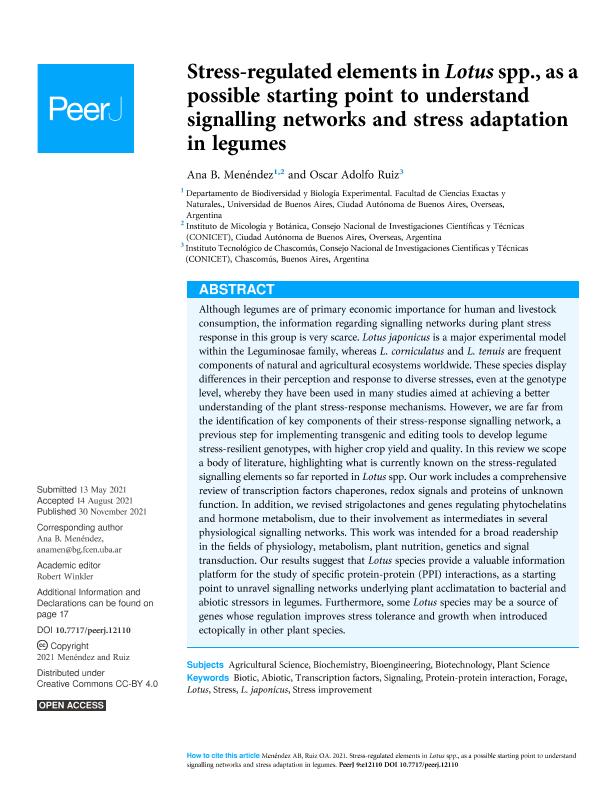Mostrar el registro sencillo del ítem
dc.contributor.author
Menendez, Ana Bernardina

dc.contributor.author
Ruiz, Oscar Adolfo

dc.date.available
2022-08-09T13:57:48Z
dc.date.issued
2021-08
dc.identifier.citation
Menendez, Ana Bernardina; Ruiz, Oscar Adolfo; Stress-regulated elements in Lotus spp., as a possible starting point to understand signalling networks and stress adaptation in legumes; PeerJ Inc.; PeerJ; 2021; 8-2021; 1-27
dc.identifier.issn
2167-8359
dc.identifier.uri
http://hdl.handle.net/11336/164731
dc.description.abstract
Although legumes are of primary economic importance for human and livestock consumption, the information regarding signalling networks during plant stress response in this group is very scarce. Lotus japonicus is a major experimental model within the Leguminosae family, whereas L. corniculatus and L. tenuis are frequent components of natural and agricultural ecosystems worldwide. These species display differences in their perception and response to diverse stresses, even at the genotype level, whereby they have been used in many studies aimed at achieving a better understanding of the plant stress-response mechanisms. However, we are far from the identification of key components of their stress-response signalling network, a previous step for implementing transgenic and editing tools to develop legume stress-resilient genotypes, with higher crop yield and quality. In this review we scope a body of literature, highlighting what is currently known on the stress-regulated signalling elements so far reported in Lotus spp. Our work includes a comprehensive review of transcription factors chaperones, redox signals and proteins of unknown function. In addition, we revised strigolactones and genes regulating phytochelatins and hormone metabolism, due to their involvement as intermediates in several physiological signalling networks. This work was intended for a broad readership in the fields of physiology, metabolism, plant nutrition, genetics and signal transduction. Our results suggest that Lotus species provide a valuable information platform for the study of specific protein-protein (PPI) interactions, as a starting point to unravel signalling networks underlying plant acclimatation to bacterial and abiotic stressors in legumes. Furthermore, some Lotus species may be a source of genes whose regulation improves stress tolerance and growth when introduced ectopically in other plant species.
dc.format
application/pdf
dc.language.iso
eng
dc.publisher
PeerJ Inc.
dc.rights
info:eu-repo/semantics/openAccess
dc.rights.uri
https://creativecommons.org/licenses/by/2.5/ar/
dc.subject
ABIOTIC
dc.subject
BIOTIC
dc.subject
FORAGE
dc.subject
L. JAPONICUS
dc.subject
LOTUS
dc.subject
PROTEIN-PROTEIN INTERACTION
dc.subject
SIGNALING
dc.subject
STRESS
dc.subject
STRESS IMPROVEMENT
dc.subject
TRANSCRIPTION FACTORS
dc.subject.classification
Biotecnología Agrícola y Biotecnología Alimentaria

dc.subject.classification
Biotecnología Agropecuaria

dc.subject.classification
CIENCIAS AGRÍCOLAS

dc.title
Stress-regulated elements in Lotus spp., as a possible starting point to understand signalling networks and stress adaptation in legumes
dc.type
info:eu-repo/semantics/article
dc.type
info:ar-repo/semantics/artículo
dc.type
info:eu-repo/semantics/publishedVersion
dc.date.updated
2022-08-03T18:10:35Z
dc.journal.volume
2021
dc.journal.pagination
1-27
dc.journal.pais
Estados Unidos

dc.journal.ciudad
San Diego
dc.description.fil
Fil: Menendez, Ana Bernardina. Universidad de Buenos Aires. Facultad de Ciencias Exactas y Naturales. Departamento de Biodiversidad y Biología Experimental; Argentina. Consejo Nacional de Investigaciones Científicas y Técnicas; Argentina
dc.description.fil
Fil: Ruiz, Oscar Adolfo. Universidad Nacional de San Martin. Instituto Tecnologico de Chascomus. - Consejo Nacional de Investigaciones Cientificas y Tecnicas. Centro Cientifico Tecnologico Conicet - la Plata. Instituto Tecnologico de Chascomus.; Argentina
dc.journal.title
PeerJ
dc.relation.alternativeid
info:eu-repo/semantics/altIdentifier/doi/http://dx.doi.org/10.7717/peerj.12110
dc.relation.alternativeid
info:eu-repo/semantics/altIdentifier/url/https://peerj.com/articles/12110/
Archivos asociados
